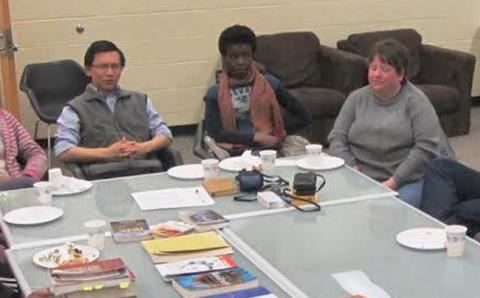Ash Wednesday
As a denomination we have learned much from Evangelical churches. It is time to return the favor. The more traditional churches have much to offer as well. Ash Wednesday belongs to that category (“Ash Wednesday”). Back in 1989, Grace Church, the church I was pastoring, was invited by St. Timothy Anglican Church to celebrate Ash Wednesday with them. I still see one of our elders walk toward the altar. After the priest applied the sign of the cross in ashes to the elder’s forehead, the elder returned to his seat with hands clasped in prayer, devoutly, serene. This is still one of the highlights of my pastoral journey. Thanks be to God who through the cross of Jesus Christ became the light of the world. In his light we become light.
—Simon Wolfert
Surrey, B.C.
Death Penalty
The argument that capital punishment is contrary to Christian teaching (“Rethinking the Death Penalty”) is an indication that theology has become uncoupled from the words of Scripture. The assumption is that modern sensitivities are a necessary and appropriate advancement on what the Bible states. Leaving aside the specific instances in the Old Testament regarding the application of the death penalty and the fact that our Lord never included it in any of his denunciations of the sins of Israel, the apostle Paul clearly stated that God had committed to human government the power of the sword (Rom. 13), a symbol of capital rather than corporate punishment.
It was Dietrich Bonhoeffer, I believe, who coined the term “cheap grace.” I believe that what Mr. Maly is promoting could be called “cheap justice.”
—Wayne Nelson
Rockford, Mich.
Prayer
I realize the “poem” on the February cover (2016) is from a novel [by Frederick Buechner], but the last line really bothers me: “and sometimes, by God’s grace, a prayer is heard.” Do we not believe that all prayers are heard? Reading it without explanation is unsettling.
—Barbara Wiebenga
Byron Center, Mich.
Religious Persecution
Some comments on Gayla Postma’s fine news report (“Synodical Report on Religious Persecution Calls for Prayer and Mobilization”):
First, it is excellent that the committee is instructed by synod to study religious persecution in general. Contrary to popular opinion, Christians are not the only people subject to such persecution—Hindus, Buddhists, and Muslims have all experienced persecution. Second, we must never identify the biblical message about the kingdom of God with the political and economic platforms of North American and Western European powers. Third, in addition to the Center for Public Justice in Washington, D.C., we in Canada have our own Citizens for Public Justice in Ottawa. I suggest the committee send a copy of the report to CPJ Canada for feedback.
—Simon Wolfert
Surrey, B.C.
The Business of Worship Music
Thank you for the insightful editorial (“The Business of Worship Music”). You point out an aspect of music writing and selection that many of us are unaware of. I have never really reflected on how we “absorb” theology seemingly unconsciously. But I agree that Christian radio, YouTube, Facebook, and the like can be strong influences in our choices. We must plan worship with musical and theological sensitivity. Popular selection and what will sell are not good standards for our church music.
I heartily endorse your statement that it is a terrible mistake to leave behind the riches of the past. I very much want my grandchildren to know and enjoy many of the great psalms and hymns my generation grew up with.
—Bruce Nikkel
Pella, Iowa
Learning How to Talk
Wendy Gritter’s article about dialoging on matters of sexual ethics (“Learning How to Talk”) is similar to the study committee report she helped author for Synod 2016 (Pastoral Guidance Re Same-Sex Marriage). Dialogue is valuable for mutual understanding, yet it tends to heighten human authority at the expense of God’s. Why does the dialogical method shy aways from passages such as 2 Timothy 3 and 1 Corinthians 5, where love for God and his people reveals a sharp antithesis between right and wrong?
—Rev. Daryl DeKlerk
Jarvis, Ont.
More Dreaming
I agree that centralizing the efforts of our denomination is not always to my taste (“More Dreaming”). But the alternative is that we become more individualistic. I would hope for a balance. If we didn’t do things together we would not be a denomination as much as a club of somewhat like-minded churches.
What makes us Reformed? Simply, I think, theology and a worldview; not missions, and certainly not worship. To suggest that our efforts should be directed to a Christian Reformed way of worship is, in my view, not a serious solution.
—Evert Vroon
Edmonton, Alta.
Real Love Lost
In response to “Real Love Lost”:
A simple review of literature as well as the testimony of many gay Christians reveal that same-sex couples have an identical capacity as heterosexual couples for deep emotional connection, virtue, fidelity, selflessness, sacrifice, self-control, and “a willingness to hold the beloved in high esteem.” On the flip side, human sciences and general human experience reveal that selfishness, abuse, infidelity, and a relationship based on “mere sexual impulses” is not contingent on one's sexual orientation but rather upon the state of one’s heart.
A peek into church history reveals that speaking and acting from a place of willful ignorance leads to deeply unChristlike actions.
—Grace Deunk
Leduc, Alta.
“Real Love Lost” implies that the recent U.S. same-sex marriage legislation was a victory only for sexual permissiveness. Truth is, the high standard of “real love” Cumings advocates is the same standard of love Christian same-sex couples venerate for their own marriages.
—Roger Gelwicks
Chicago, Ill.









